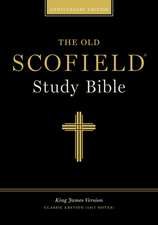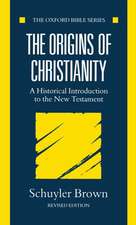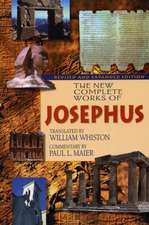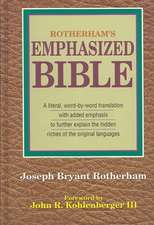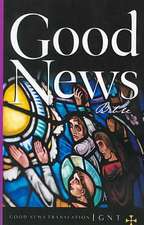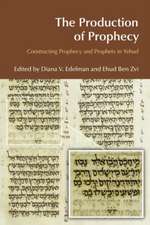The Poetics of Biblical Narrative – Ideological Literature and the Drama of Reading: Biblical Literature
Autor Meir Sternbergen Limba Engleză Paperback – 31 iul 1987
" Sternberg] has written a very important book, both for his comprehensiveness and for the clearly-avowed faith stance from which he understands and interprets the strategies of the biblical narratives.... a superb overview... " Theological Studies
..". rated very highly indeed. It is a book to read and then reread." Modern Language Review
..". Sternberg has accomplished an enormous task, enriching our understanding of the theoretical basis of biblical narrative and giving us insight into a remarkable number of particular texts." Journal of the American Academy of Religion
..". an important book for those who seek to take the Bible seriously as a literary work because it shows, more clearly and emphatically than any book I know, that the Bible is a serious literary work a text manifesting a highly sophisticated and successful narrative poetics." Adele Berlin, Prooftexts"
Preț: 286.06 lei
Nou
Puncte Express: 429
Preț estimativ în valută:
54.74€ • 56.94$ • 45.19£
54.74€ • 56.94$ • 45.19£
Carte disponibilă
Livrare economică 24 martie-07 aprilie
Livrare express 07-13 martie pentru 49.90 lei
Preluare comenzi: 021 569.72.76
Specificații
ISBN-13: 9780253204530
ISBN-10: 0253204534
Pagini: 596
Dimensiuni: 153 x 228 x 39 mm
Greutate: 0.79 kg
Editura: MH – Indiana University Press
Seria Biblical Literature
ISBN-10: 0253204534
Pagini: 596
Dimensiuni: 153 x 228 x 39 mm
Greutate: 0.79 kg
Editura: MH – Indiana University Press
Seria Biblical Literature
Cuprins
Preface
1. Literary Text, Literary Approach: Getting the Questions Straight
Discourse and Source
Fiction and History
Form and Doctrine
The Drama of Reading
2. Narrative Models
3. Ideology of Narration and Narration of Ideology
Omniscience Charged and Monopolized: The Epistemological Revolution
The Omnipotence Effect: Control Claimed and Disclaimed
4. Viewpoints and Interpretations
Point of View and Its Biblical Configuration
The Wooing of Rebekah
Positions and Discrepancies Established
The Movement form Divergence to Convergence of Perspectives
New Tensions and Final Resolution
5. The Play of Perspectives
Narrator vs. God
Narrator and Reader vs. God and Characters Spheres of Communication
Three Reading Positions
From Plot to Perspective
From Ignorance to Knowledge
Privilege and Performance
6. Gaps, Ambiquity and the Reading Process
The Literary Work as a System of Gaps
The Story of David and Bathsheba: On the Narrator's Reticence and Omissions
The Ironic Exposition
What Is the King Doing in the City?
Uriah the Hittite Recalled to Jerusalem
Does Uriah Know about His Wife's Doings? The Twofold Hypothesis
What Does David Think That Uriah Thinks? The Three-Way Hypothesis
How Joab Fails to Carry Out David's Order
The Analogy to the Story of Abimelech and the Woman
On Mutually Exclusive Systems of Gap-Filling: Turning the Screws of Henry James and Others
7. Between the Truth and the Whole Truth
Foolproof Composition in Ambiguity
The Relevance of Absence
Temporary and Permanent Gapping
The Echoing Interrogative
Opposition in Juxtaposition
Coherence Threatened and Fortified
Norms and Their Violations
From Gapping to Closure: The Functions of Ambiguity
8. Temporal Discontinuity, Narrative Interest, and the Emergence of Meaning
Suspense and the Dynamics of Prospection
The Pros and Cons of Suspense in the Bible
Modes of Shaping the Narrative Future
Darkness in Light, or: Zigzagging toward Sisera's End
Curiosity and the Dynamics of Retrospection
Joseph and His Brothers: Making Sense of the Past
Surprise and the Dynamics of Recognition
9. Proleptic Portraits
Character and Characterization: From Divine to Human
Why the Truth about Character Does Not Suffice
The Art of the Proleptic Epithet
Epithets and the Rule of Forward-looking Exposition
10. Going from Surface to Depth
Character as Action, Character in Action
The Composition of Character and the Limits of Metonymic Inference
Old Age in Genesis
Good Looks in Samuel
11. The Structure of Repetition: Strategies of Informational Redundancy
Similarity Patterns and the Structure of Repetition
Formulaic Convention or Functional Principle?
Constant and Variable Factors
Verbatim Repetition
Repetition with Variation: Forms and Functions of Deviance
Repetition and Communication: Pharah's Dream
Basic Axes and Natural Combinations
From Natural to Functional Combinations
Deliberate Variation: (Figural) Rhetoric within (Narratorial) Rhetoric
Generic Transformation into Parable
Permutations and Some Complications
Repetition and Narrative Art: Some General Consequences
12. The Art of Persusion
Persuading in the Court of Conscience
Delicate Balance in the Rape of Dinah
The Rhetorical Repertoire
13. Ideology, Rhetoric, Poetics
Justifying the Ways of God to Man: Saul's Rejection
Dancing in Chains
Dialogue as Pressure, Variations as Judgment
Convergence with Belated Discovery: Rhetorical Overkill
Notes
Index
1. Literary Text, Literary Approach: Getting the Questions Straight
Discourse and Source
Fiction and History
Form and Doctrine
The Drama of Reading
2. Narrative Models
3. Ideology of Narration and Narration of Ideology
Omniscience Charged and Monopolized: The Epistemological Revolution
The Omnipotence Effect: Control Claimed and Disclaimed
4. Viewpoints and Interpretations
Point of View and Its Biblical Configuration
The Wooing of Rebekah
Positions and Discrepancies Established
The Movement form Divergence to Convergence of Perspectives
New Tensions and Final Resolution
5. The Play of Perspectives
Narrator vs. God
Narrator and Reader vs. God and Characters Spheres of Communication
Three Reading Positions
From Plot to Perspective
From Ignorance to Knowledge
Privilege and Performance
6. Gaps, Ambiquity and the Reading Process
The Literary Work as a System of Gaps
The Story of David and Bathsheba: On the Narrator's Reticence and Omissions
The Ironic Exposition
What Is the King Doing in the City?
Uriah the Hittite Recalled to Jerusalem
Does Uriah Know about His Wife's Doings? The Twofold Hypothesis
What Does David Think That Uriah Thinks? The Three-Way Hypothesis
How Joab Fails to Carry Out David's Order
The Analogy to the Story of Abimelech and the Woman
On Mutually Exclusive Systems of Gap-Filling: Turning the Screws of Henry James and Others
7. Between the Truth and the Whole Truth
Foolproof Composition in Ambiguity
The Relevance of Absence
Temporary and Permanent Gapping
The Echoing Interrogative
Opposition in Juxtaposition
Coherence Threatened and Fortified
Norms and Their Violations
From Gapping to Closure: The Functions of Ambiguity
8. Temporal Discontinuity, Narrative Interest, and the Emergence of Meaning
Suspense and the Dynamics of Prospection
The Pros and Cons of Suspense in the Bible
Modes of Shaping the Narrative Future
Darkness in Light, or: Zigzagging toward Sisera's End
Curiosity and the Dynamics of Retrospection
Joseph and His Brothers: Making Sense of the Past
Surprise and the Dynamics of Recognition
9. Proleptic Portraits
Character and Characterization: From Divine to Human
Why the Truth about Character Does Not Suffice
The Art of the Proleptic Epithet
Epithets and the Rule of Forward-looking Exposition
10. Going from Surface to Depth
Character as Action, Character in Action
The Composition of Character and the Limits of Metonymic Inference
Old Age in Genesis
Good Looks in Samuel
11. The Structure of Repetition: Strategies of Informational Redundancy
Similarity Patterns and the Structure of Repetition
Formulaic Convention or Functional Principle?
Constant and Variable Factors
Verbatim Repetition
Repetition with Variation: Forms and Functions of Deviance
Repetition and Communication: Pharah's Dream
Basic Axes and Natural Combinations
From Natural to Functional Combinations
Deliberate Variation: (Figural) Rhetoric within (Narratorial) Rhetoric
Generic Transformation into Parable
Permutations and Some Complications
Repetition and Narrative Art: Some General Consequences
12. The Art of Persusion
Persuading in the Court of Conscience
Delicate Balance in the Rape of Dinah
The Rhetorical Repertoire
13. Ideology, Rhetoric, Poetics
Justifying the Ways of God to Man: Saul's Rejection
Dancing in Chains
Dialogue as Pressure, Variations as Judgment
Convergence with Belated Discovery: Rhetorical Overkill
Notes
Index
Notă biografică
Meir Sternberg










